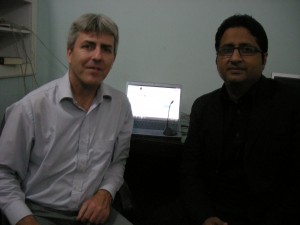Lahore-London Interreligious Dialogue via Skype
Liam O'Callaghan, Columban Priest, Lahore
 In an attempt to promote deeper engagement in our Justice, Peace and Integrity of Creation (JPIC) priorities from an interfaith perspective, the Columban JPIC Education officer in Britain, James Trewby, came up with the novel idea of using the medium of Skype. James works with a number of Catholic schools in London trying to raise awareness of Columban priority JPIC issues such as climate change, migration and human rights and does so in the context of a very multi-cultural, multi-religious environment.
In an attempt to promote deeper engagement in our Justice, Peace and Integrity of Creation (JPIC) priorities from an interfaith perspective, the Columban JPIC Education officer in Britain, James Trewby, came up with the novel idea of using the medium of Skype. James works with a number of Catholic schools in London trying to raise awareness of Columban priority JPIC issues such as climate change, migration and human rights and does so in the context of a very multi-cultural, multi-religious environment.
In the build-up to the UN Climate Change Conference, COP21, which begins in Paris on 30 November, Columban JPIC ministry has been very active in raising awareness, campaigning and lobbying world leaders to come up with a binding agreement to limit greenhouse gas emissions. James was aware of my involvement in Lahore with Haroon Akram Gill, a Muslim climate change activist, and of our efforts to create an interfaith climate movement. In our conversations the idea of a Skype call emerged so as to expose the children in London to a core JPIC priority being worked on as an interfaith partnership.
On 19 October we linked up on Skype, with fingers crossed that the technology and internet connection would work smoothly. James had prepared 10 students from St Bonaventure’s Catholic school in Forest Gate, London with the help of the lay chaplains, Jessica Barnett and Julia Corcoran. The students had prepared questions for us which they asked in turn. The main theme chosen was Climate Change/COP21 and interfaith cooperation in that effort. But once we got started, the conversation took on a life of its own, with questions ranging from the situation in Pakistan, the question of minorities, stereotypes and a long discussion of prejudice and violence. The topic that seemed to grab their attention the most was the two of us, Haroon and I, Muslim and Christian, working together on this issue.
Having had a successful launch, we followed in up with a second Skype call to a bigger group of 19 students in the same school on 6 November. This was equally successful with a lively conversation based on their wide-ranging and well-prepared questions. This time the quality of the connection was not so good and at times it was a little difficult to hear but we managed to get through it OK.
We have further plans to continue this contact with ideas such as doing it with the full morning assembly using big screens for the children. Modern technology has the ability to reach out in all sorts of ways, not even imaginable a few short years ago.
